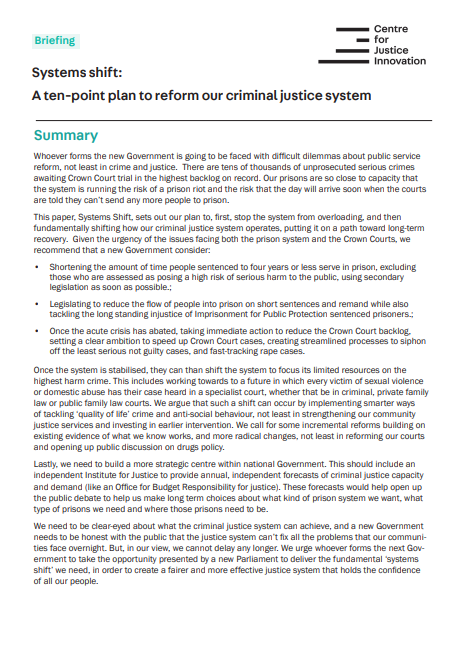Systems shift: A ten-point plan to reform our crimi nal justice system
By Centre for Justice Innovation
Whoever forms the new Government is going to be faced with difficult dilemmas about public service reform, not least in crime and justice. There are tens of thousands of unprosecuted serious crimes awaiting Crown Court trial in the highest backlog on record. Our prisons are so close to capacity that the system is running the risk of a prison riot and the risk that the day will arrive soon when the courts are told they can’t send any more people to prison. This paper, Systems Shift, sets out our plan to, first, stop the system from overloading, and then fundamentally shifting how our criminal justice system operates, putting it on a path toward long-term recovery. Given the urgency of the issues facing both the prison system and the Crown Courts, we recommend that a new Government consider: • Shortening the amount of time people sentenced to four years or less serve in prison, excluding those who are assessed as posing a high risk of serious harm to the public, using secondary legislation as soon as possible.; • Legislating to reduce the flow of people into prison on short sentences and remand while also tackling the long standing injustice of Imprisonment for Public Protection sentenced prisoners.; • Once the acute crisis has abated, taking immediate action to reduce the Crown Court backlog, setting a clear ambition to speed up Crown Court cases, creating streamlined processes to siphon off the least serious not guilty cases, and fast-tracking rape cases. Once the system is stabilised, they can than shift the system to focus its limited resources on the highest harm crime. This includes working towards to a future in which every victim of sexual violence or domestic abuse has their case heard in a specialist court, whether that be in criminal, private family law or public family law courts. We argue that such a shift can occur by implementing smarter ways of tackling ‘quality of life’ crime and anti-social behaviour, not least in strengthening our community justice services and investing in earlier intervention. We call for some incremental reforms building on existing evidence of what we know works, and more radical changes, not least in reforming our courts and opening up public discussion on drugs policy. Lastly, we need to build a more strategic centre within national Government. This should include an independent Institute for Justice to provide annual, independent forecasts of criminal justice capacity and demand (like an Office for Budget Responsibility for justice). These forecasts would help open up the public debate to help us make long term choices about what kind of prison system we want, what type of prisons we need and where those prisons need to be. We need to be clear-eyed about what the criminal justice system can achieve, and a new Government needs to be honest with the public that the justice system can’t fix all the problems that our communi ties face overnight. But, in our view, we cannot delay any longer. We urge whoever forms the next Gov ernment to take the opportunity presented by a new Parliament to deliver the fundamental ‘systems shift’ we need, in order to create a fairer and more effective justice system that holds the confidence of all our people.
London: Centre for Justice Innovation, 2024. 20p.


